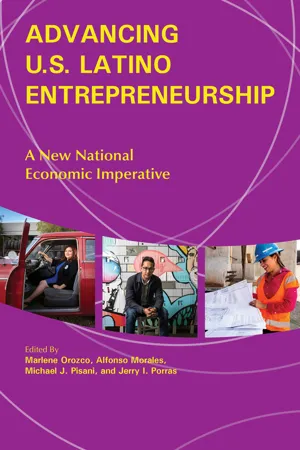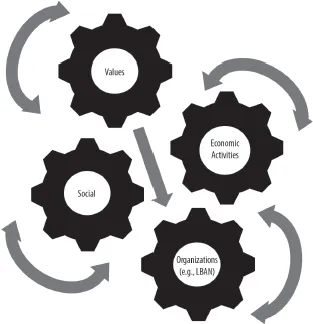![]()
PART I
AN INTRODUCTION TO LATINO ENTREPRENEURSHIP – HISTORICAL PERSPECTIVES AND DATA SOURCES
![]()
CHAPTER 1
Introduction: Advancing U.S. Latino Entrepreneurship
Marlene Orozco, Alfonso Morales, Michael J. Pisani, and Jerry I. Porras
What is entrepreneurship? As a fairly recent innovation in economic organization, it is the formation of an organization by way of multiple processes that minimize the risks associated with establishing a business. Shane (2003:4) defines entrepreneurship as “an activity that involves the discovery, evaluation and exploitation of opportunities to introduce new goods and services, ways of organizing, markets, processes, and raw materials through organizing efforts that previously had not existed.” Entrepreneurship has also been conceived of as “the pursuit of opportunity beyond resources controlled” (Eisenmann 2013); as exploiting market opportunities, however large or small or at the margins of the economy (Kirzner 1973); as innovation in a dynamic environment that creates and destroys firms (Schumpeter 1912; Schumpeter 1942); and as opportunity or necessity-led self-employment (Williams 2007). Each of these definitions represents observations made of ideas and behaviors in particular social contexts. The definitions represent the interpretation of interaction, and likewise, the notion of ethnic entrepreneurship is not static and must conceptually be responsive to context. Let us first consider the entrepreneurship element of this notion.
Entrepreneurship has a long history of usage in describing the management of activities and indeed has only recently come to its particular economic usage. Likewise, the “economic” as independent of households or politics is also a fairly recent creation of modernity (Hirschman 1958). The Greeks consider the oikos a matter of managing household consumption, not the creation of goods and services, measured independently of households, politics, and religion (Booth 1993). Modernity complemented our original place-based notion of a market with abstract notions of capital, labor, and land markets as well as a variety of other ideas distinguishing the economy as a distinct institution. However we have measured economic activity, we have never fully separated it from other social institutions. In fact, households, politics, and religion all live in relatively reciprocal relationships with economic activity.
Still, it is this ability to measure that reifies economic activity and makes for analytic techniques to understand the economy and training techniques to hone success in economic activities. This reification allows us to say that generally speaking, capitalist economic organization allocates resources efficiently to clear markets—that is the theory anyway. However, for at least a century, scholars have uncovered two broad types of market distortions: collusion, which impedes efficiency, and discrimination, which impedes transactions that clear markets. Both have been labeled and described as “social constructions” that indicate how the economy is part of society. In fact, the constructivist perspective shows us that what the economist perspective labels “distortions” are, from other perspectives, the way people otherwise ignored by the dominant perspective express their economic ambitions and activities and the people practicing them—that is, how women, ethnic minorities, and their economic practices are structured in the shadow of the larger economy and society. Out of that shadow, we advance this volume.
Our interest is in entrepreneurship as practiced by Latino populations historically and with respect to distinct types of business and scales of analyses. Further, we are also describing organizational tools and analytic techniques for fostering that participation in the broader economy, and thus we are describing the work of the Latino Business Action Network (LBAN) and the creation of the Stanford Latino Entrepreneurship Initiative (SLEI). As an innovative aspect of this volume, we advance a dual-pronged objective of using research evidence to inform current and aspiring entrepreneurs as well as scholarship on ethnic entrepreneurship.
Figure 1.1 illustrates these various relationships by way of a mechanical gear metaphor, each part shifting and contributing to the whole of economic life. The specific opportunity we address is assembling research and tools of engagement that show the world how people of color, specifically Latinos, are the cornerstone of the emerging economy and, further, how programmatic activities are leveraging Latino assets and values across the economy as well as how the economy interfaces with society. The framework in Figure 1.1 shows that Latino (and broadly human) values are in a reciprocal relationship with economic practices. We purposefully chose what looks like integrated gears to show how values drive economic efforts. However, we must point out that like mechanical gears, there can be some slippage and incomplete meshing of the gears. Likewise, often—as in the case of persons passionately pursuing their business in the service of their family—those gears can be tightly fit, with the work driving entrepreneurs past exhaustion in pursuit of opportunities for their family. Irrespective of interpretation, readers should note that this framework is explicitly constructivist, initiated from broad social values that are refined or complemented by experience and training and implemented in economic activities, specifically businesses. Further, as readers will discover, authors in our collection attend to many questions of scale and scope of business activity and also exhibit a concern with business type and location while also expressing criticism of existing structures of support.
Figure 1.1 Latino entrepreneurship framework.
With this in mind, let us now consider the “ethnic” of ethnic entrepreneurship. Defining the ethnic is difficult, as the term’s definition varies with historical context. While we might be frustrated by the lack of a stable definition of “Latino,” such stability is afforded only to physical sciences and then is often questioned in liminal spaces of analyses as physicists, chemists, and other scientists wrestle with definitional questions. Hence, for us the absence of a stable definition is particularly pernicious, as it impedes policy, itself reliant—at least occasionally—on scientific understanding of social life. However, we are not dismayed, as contingency is the rule, and our effort here extends understanding even if we cannot provide final answers to the question of who is or is not a Latino. This volume does distinguish between race and ethnicity but also works with or combines the study of race and ethnicity. Furthermore, when possible authors consider both the meso-level group processes and the macro- or structural-level processes at play that condition life chances (Valdez and Golash-Boza 2017). It is not our position that the concepts of ethnicity and race are interchangeable, as these projects often come from distinct vantage points. As noted by Valdez and Golash Boza (2017), the ethnicity paradigm is often one of inclusion, whereas the racial paradigm is one of exclusion. What we do wish to make clear here is that authors are often confined to other scientists’ definitions in the collection of data, and thus there are not only first-order questions of identity but also second-order questions of interpreting data collected in different sociohistorical circumstances and for uses that never mesh perfectly with the authors’ problem.
Thus, readers will find in these chapters a creative variety of approaches to the presence or definition of “Latino.” Some authors infer presence in one set of data from another (Robles, Morales, and Pisani, Chapter 4), others offer calculations of degree (Pisani and Guzman, Chapter 10), and still others suggest that conformity to existing definitions is sufficient to their chosen task. For us, “Latino” is in part a construction of power relationships and the imposition of categories and in part a self-construction of an “imagined community” (Anderson 1983). At the heart of each is interaction—interactions from which participants learn, impart learning to others, and change what is learned over time. Ultimately we offer no universally applicable definition, instead reminding readers that the appropriate definition will vary by the authors’ purposes, the questions they seek to answer, or the arguments they wish to evince. As such, however important the imposition of a label, equally important can be the response. We acknowledge that the ambiguity of pan-eth...

